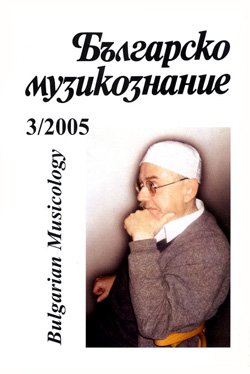Понятието класическа музика в контекста на някои азиатски култури
The Concept of Classical Music in the Context of Some Asian Cultures
Author(s): Ivanka VlaevaSubject(s): Music
Published by: Институт за изследване на изкуствата, Българска академия на науките
Summary/Abstract: The survey discusses the notion of classical music with reference to a certain period and social background, but mainly in the Asian context. It presents one of the notion’s layers of semantics, formed during the 20th century and especially the second part of it. The article poses some key questions-How some of the basic concepts of classical music in Europe fit the concepts of Indian, Arab, Iranian, Thai and other eastern types of classical music? To what extent classical music is preserved in the different Asian regions and what are its characteristics in comparison with European classical music? Are the facts recorded in literary and audio-visual sources simply history, or do they still exist in practice? Posing such topical problems is connected with the functioning of a complex of phenomena. They represent the major layer of semantics in the concept of classical music. The concept is interpreted as an oral professional tradition having a written theoretical system underneath, a system that has not been preserved in contemporary European musical practice but is still bearing extreme importance for the majority of Asian cultures. The author’s personal experience with some of them during the last two decades allowed her to get acquainted with their characteristics through the methods of participant observation, interviewing and chronometrical analysis. It turned out that, for example, musical traditions dated centuries back are preserved in India to the present day, which reinserts a certain fact. The live practice of classical music there is still existent, even at the beginning of 21st century, with minor changes, as one can listen to it in old recordings dated some half a century ago. The tradition is part of the way of life of a certain social stratum and remained unchanged to a great extent. During the second visit of the author to India in March and April 2004, she had the chance to witness the contemporary existence of this phenomenon of classical music. Her face-to-face conversations and impressions from Indians confirmed her conclusions. In music, apart from film music, the century long tradition is followed strictly, even one may say conservatively. This is a discriminative feature from traditions in literature and painting, where new trends establish new ways of development. The author’s observation of concert practices and the process of education serve as valuable proof materials. Through them she can make a comparison between contemporary existence of classical music and facts from literary sources, as well as her aural experience from audio recordings and concert activities. She chanced to be present at different situations when classical music was performed. One of them is a typical form of “concert”, which continues its existence even in the beginning of the 21st century, called private concerts “on occasion”. These are sometimes organized in commemoration of a member of the family, a close relative, or for honoring ...
Journal: Българско музикознание
- Issue Year: 2005
- Issue No: 3
- Page Range: 72-84
- Page Count: 13
- Language: Bulgarian
- Content File-PDF

